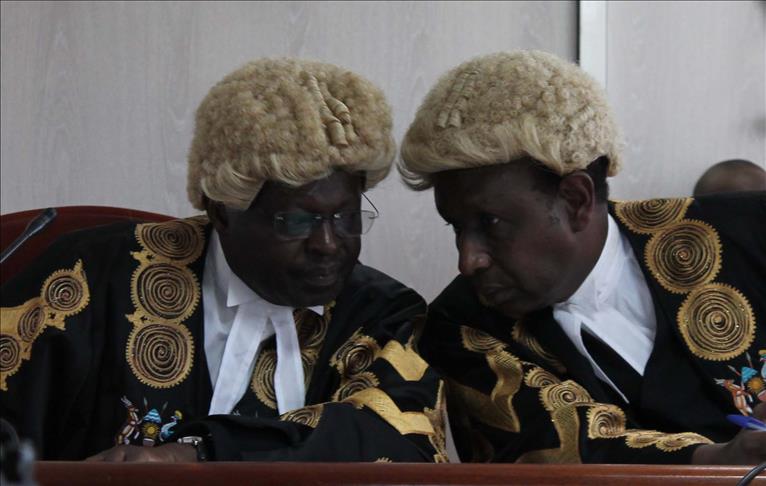
KAMPALA
Uganda’s Supreme Court on Friday overturned the country's controversial Anti-Homosexuality Act.
"The Act of the 9th Parliament in enacting the Anti-Homosexuality Act 2014 on the 20th December 2013 without quorum in the house is inconsistent with and in contravention of Articles 2(1) (2) and Article 88 and 94 of the constitution of the Republic of Uganda and rule 23 of the Parliamentary rules of procedure and thus null and void," the five-judge panel ruled.
In March, several human rights campaigners and gay activists petitioned the Supreme Court challenging the law.
During the first hearing on Wednesday, human rights campaigner Nicholas Opio, one of the plaintiffs, raised a procedural question as to the quorum in Parliament on the 20th of December 2013 which was in contravention of the constitution.
He told court that on that day the prime minister drew the attention of the Parliament speaker about the lack of quorum, a point that was she ignored.
"It is clear from that evidence that at least three members of Parliament including the Prime Minister expressed concern about the issue of lack of quorum," Justice Steven Kavuma told a fully packed court room.
"We come to a conclusion that she acted illegally and failure to obey the law rendered the law enacting process a nullity," he added.
"The Act itself so enacted by this reason alone is unconstitutional," said Justice Kavuma.
The Anti-Homosexuality law 2014 was passed by Parliament on December 20th and later signed into law by President Yoweri Museveni.
The legislation provides for a sentence of life imprisonment for anyone convicted of homosexuality among other tough sentences.
Ugandan MPs in passing the law argued that it was meant to protect the traditional family setting by prohibiting sexual relations by persons of the same sex.
The law is to be used to strengthen the nation’s capacity to check emerging threats to traditional family values, they added.
But the legislation had drawn international criticism, including from US President Barak Obama, and strained Uganda's relations with several of its donor countries.
Tension
Efforts to get in touch with the government side for a comment by Anadolu Agency have been futile since most of the officials were not answering their phones.
But outside the court, the lawyers for the petitioners could not hide their excitement.
"This judgment upholds the rule of law and constitutionalism and everybody should be happy about it," Ladislaus Rwakafuzi told reporters.
"If the state is not satisfied with the ruling they can try and appeal but this law is no more."
Jacquline Nabagesera, a gay activist and one of the nine petitioners, agreed.
"We are happy with the ruling and we shall continue to run to court whenever our rights are violated."
After the judgment, anti-gay activist and Pastor Martin Ssempa and his religious colleagues walked out in protest arguing that the law is not fair and demanding that the independence of the judiciary be investigated.
They carried placards reading: "We don't support sodomy" and "Ugandans say no to homosexuality."
Tensions had gripped the fully-packed court room before the verdict with Ssempa praying and handing over the nation to God.
The pro-gay activists then objected to the praying with Nabagesera directing questions at the pastor as to why he thought they all needed his prayers.
A police officer was called in to ask the pastor to keep quiet and get seated as onlookers awaited the ruling.
Anadolu Agency website contains only a portion of the news stories offered to subscribers in the AA News Broadcasting System (HAS), and in summarized form. Please contact us for subscription options.

